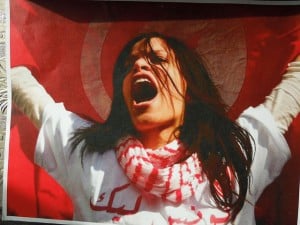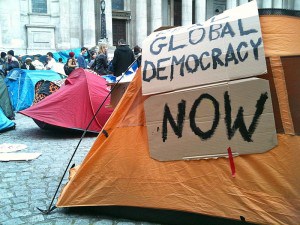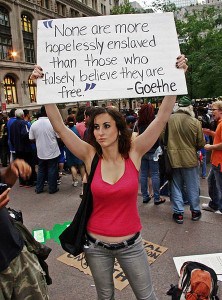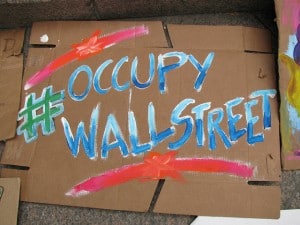
By: Sophie McAdam,
In December 2010, a desperate Tunisian man set himself on fire after he was denied the right to sell fruit and vegetables in the street. This hopeless, tragic act sparked nationwide protests against the government that were to send president Zine El Abidine Ben Ali fleeing in exile from Tunisia. The people´s uprising gathered momentum overnight, spreading like wildfire across Northern Africa through Algeria, Jordan, Oman, Egypt, Yemen, Bahrain, Morocco, Lebanon and Saudi Arabia, to name a few. The Arab Spring continued to make headlines throughout 2011, but the global revolution didn´t end there.
In Southern Europe, the crippling financial crisis and anger over a deeply entrenched culture of political corruption set in motion a tidal wave of anti-government protests. Portuguese youths took to the streets in March 2011 demanding labor rights and an end to crushing austerity measures. Violent riots broke out in bankrupt Greece and Italy, where the European Union under IMF instruction had suspended democracy and installed former bankers in place of elected leaders. And in Spain, a small group of anti-capitalists calling themselves the indignados set up camp in Madrid´s Puerta del Sol square on May 15, vowing to stay there until their cry for ´Real Democracy Now!´had been heard by the country´s duplicitous leaders.

By September 17, the sweet scent of revolution had crossed the Atlantic and exploded into being in New York, where Zuccotti Park became a beacon for thousands of disillusioned Americans to campaign against financial inequality and corporate corruption. The Occupy movement was born, and by October 9 there were 600 communities in the USA alone.
A global day of protest saw demonstrations in 951 cities (82 countries) across the globe. Many of those protesters did not go home that day, and the Zuccotti park encampment was to inspire similar tent cities all over the world. Millions of people put their lives on hold to pitch their tents and participate in this peaceful struggle, from Waikiki to India, Kuala Lumpur to Iceland, New Zealand to Chile, London to Korea, China to Brazil, the Phillipines to South Africa, Poland to Australia. In fact, the only continent without occupations and protests was Antarctica.
An incredible achievement? A beacon of hope for a fairer world? Without a doubt, new possibilities twinkled like stars on the horizon. But this month, which marks the second anniversary of the biggest grassroots rebellion in the history of humanity, many commentators have declared the Occupy movement dead.
Let´s get one thing straight: Occupy did not die, it was murdered by a state-sponsored savaging of civil rights, by the barbaric use of pepper spray, tasers, batons, water cannons and rubber bullets. Occupy was murdered by cowardly, robotic men in uniform too dumb to realize this fight belongs to all of us, for all our children and theirs. Occupy was murdered when thousands of tent cities were dismantled through a level of police brutality never seen before, through book-burning and violent arrests, through the replacement of hope by fear. The message from the state was stark and crystal-clear, reinforced through legislation aiming to make it impossible for direct action like this to ever happen again.
Yes, Occupy was murdered- but only physically. The spirit of the movement, the dreams of the people involved, the strength of true community and the bonds of friendship forged in those temporary citadels of hope cannot be crushed. Occupy lives on in every activist who took part, whether on the streets or in solidarity from the comfort of their own homes. It lives on in the crucial debates about wealth inequality that were sparked as a result, in conversations that took place and continue to do so in living rooms, schools, workplaces and universities around the world, and it even lives on in pockets of the mainstream media, where once reluctant and cynical commentators were eventually forced to pay attention to the issues being raised by Occupy after recognizing widespread public support for its cause.

The spirit of Occupy didn´t disappear, it simply diversified and developed, branching out into a myriad of different projects and causes. Many activists went on to fight the injustice of home foreclosures and provide support to those millions of newly-homeless families, and in California this battle was won when a homeowner´s bill of rights was passed. Occupy inspired the determined and unbridled energy of the Idle No More movement´s fight against fracking and the Keystone XL pipeline, and their demand of justice for native American communities (not to mention mother Earth herself).
Occupy activists played a leading role in the aftermath of Superstorm Sandy, organizing donation points across the city, delivering food and medication to vulnerable residents, helping people repair their homes and lending a hand to all those who needed it, regardless of color, class or religion. They have continued to fight against student and medical debt, against excessive banker bonuses, against tax breaks for the elite, against corporate lobbying and offshore tax havens. Occupy activists went on to launch magazines and websites, alternative currencies and time banks, transition towns, skill-swapping initiatives, and hundreds of diverse community support projects across the world, creating change from the bottom up.
The 2011 global revolution, however brief, gave the silent majority a voice and a purpose. It gave them memories that will never allow them to feel hopeless, that will never allow their passion to lay dormant again. It gave fresh meaning to the word community, it led to an increase in volunteering and people switching from banks to credit unions. It brought together an eclectic mix of people with one pure and beautiful vision of a fair and equal world based on co-operation rather than competition. The dream of Occupy attracted children and the elderly, army veterans and anti-war protesters, middle-class families and poor students, Jews and Muslims, Christians and Atheists from all walks of life, all willing to listen and all willing to share. It forced many otherwise apathetic citizens to take an interest in politics, and all over the planet, many politicians finally did the right thing and campaigned on activists´ behalf too.
The haters said that Occupy´s demands were vague and fragmented, unrealistic and childish. They claimed that an aversion to leadership was the downfall of the movement, that the demonstrations had no clear aims, no structure, no workable plan or key demands. But in light of what Occupy was fighting against, in light of what it was- a movement against corporatism and political corruption, a movement aiming to highlight the enormous failings of the system as a whole- it would have been inappropriate to have taken traditional avenues of ballot boxes, lobbying and petitions. To do so would have been paradoxical, hypocritical, and a sell-out of Occupy´s core ideals. To believe these actions could instigate change would have been naïve.

Surely the genius of Occupy, Spain´s 15-M and other movements throughout 2011-12 was that they bypassed politics to speak directly to the masses. The global uprising has certainly succeeded in shining a light on the shady relationship between money and politics, the huge failings of representative democracy, the problems caused by global wealth inequality, and the pure greed of the global corporations and financial institutions that pull the strings of our puppet governments. And now, thanks to those who (literally) shouted it from the rooftops, we all know the truth.
It´s interesting to consider that the Apocalypse, earmarked for 2012 by frothy-mouthed fundamentalists of all stripes in many cults and religions worldwide, did in truth happen last year. The Greek word, long since manipulated and misused, misunderstood and heavy with negative associations, actually refers to a revelation, a ´great unveiling´, the realization of that which has previously been hidden.
Occupy taught us that you can´t win a physical fight against armed police, but you can win the battle of the mind through peaceful non-resistance and the building of community outside of traditional hierarchical structures. Victor Hugo once wrote: “One can resist the invasion of armies, but not the invasion of ideas.” And while the tent cities were crushed, the spirit of Occupy was not. We still have a long way to go, but the giant has awoken…and will sleep no more.
Sophie is an award-winning feature writer, investigative journalist, campaigner and author. She is a staff writer for True Activist on issues of peace, justice, society, environment and activism. You can find out more or contact her here.


